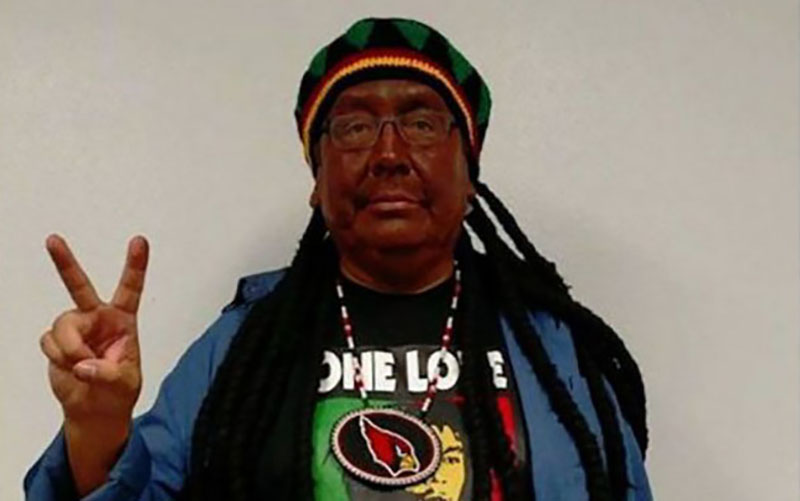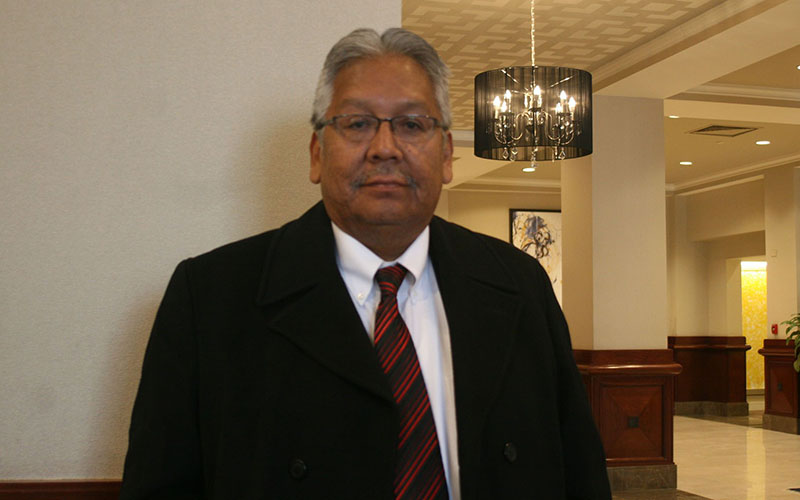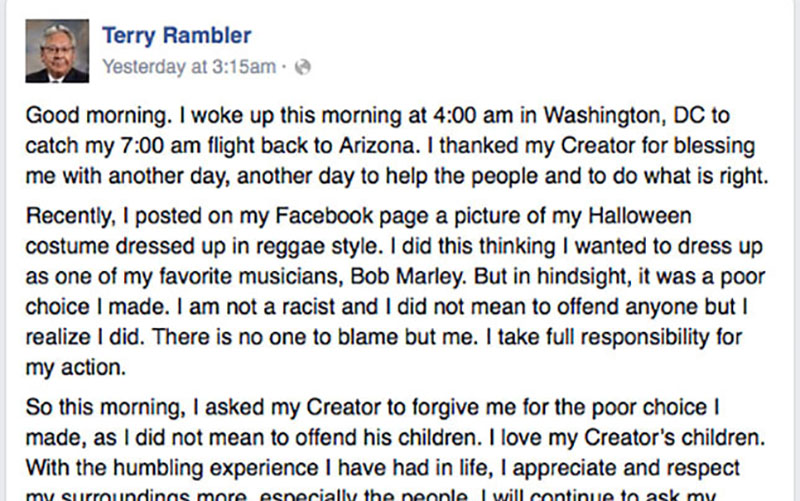
San Carlos Apache Chairman Terry Rambler said he was just trying to dress as Bob Marley, one of his favorite musicians, but admits now that it was a “poor choice.” (Photo courtesy Facebook)

San Carlos Apache Chairman Terry Rambler in a file photo from February, when we was in Washington with leaders of other tribes for meetings on tax issues. (Photo by Miranda Leo/Cronkite News)

San Carlos Apache Chairman Terry Rambler’s apology on his Facebook page after the futor sparked when he decided to don blackface as part of a Halloween costume. (Photo courtesy Facebook)
WASHINGTON – San Carlos Apache Chairman Terry Rambler’s apology for appearing in blackface as part of a Halloween costume brought varied responses – but agreement that the tribal leader should have known better.
Rambler, who has supported efforts to force the Washington Redskins to change what critics call a racially insensitive name, made national headlines when he posted a Facebook picture of himself as reggae musician Bob Marley, with his face darkened as part of the costume.
He pulled the photo down from his page and posted an apology in its place early Thursday, asking for forgiveness from his Creator, his people, the public and anyone he may have offended.
“I am not a racist and I did not mean to offend anyone but I realize I did,” the apology said.
He said he only meant to dress up “in reggae style … as one of my favorite musicians, Bob Marley.” But in hindsight, he said the costume, which included a knit hat, dreadlocks and a Marley T-shirt, “was a poor choice I made.”
“There is no one to blame but me. I take full responsibility for my action,” his apology said.
Rambler could not be reached for comment Friday. But Don Harris, president of the Maricopa County chapter of the NAACP, said he does not think Rambler acted with bad intentions.
“It wasn’t the smartest thing for a gentleman in his position to do,” Harris said. “Just knowing of the man and what he’s done in his life, there was no animosity (toward) black people.”
But the Rev. Jarrett Maupin, a Valley civil rights activist, was not as forgiving. Maupin called the apology “hollow” and said he was outraged by what he called “an intentional act” and not a simple mistake.
“This isn’t someone who isn’t acutely aware of the long-lasting implications and the very negative implications of racial mockery,” Maupin said of Rambler.
Maupin, who had originally asked for an apology, took to Twitter Thursday morning to call for Rambler’s resignation as head of his tribe and as chairman of the Arizona Indian Gaming Association. He has since backed away from that demand, but said Rambler still needs to reach out to black leaders to discuss what happened and how to move forward.
“I’m hoping that when we both get back to our mutual home … we can sit down and talk and forge a new bond and try to move forward,” said Maupin, adding that he has worked with Rambler “on the civil rights battlefield” previously.
Maupin said someone who is the leader of a sovereign nation should know better, and he was disappointed that Rambler’s apology made no specific references to black people and their culture.
“He quite clearly offended a vast majority of black Americans. I think that’s been expressed over social media,” Maupin said.
But Amanda Blackhorse, a Navajo woman who is the lead plaintiff in the case against the Washington Redskins, said she thought the apology was genuine.
“I’m happy that he apologized, and I feel like he was sincere in his apology,” Blackhorse said.
She said she supports Rambler as she has supported others who have sincerely apologized for behavior deemed offensive. She pointed to musician Pharrell Williams, who apologized for wearing a headdress on the cover of a British magazine.
Blackhorse said there is no defense for donning blackface, but noted that Native Americans deal with offensive cultural appropriations all the time – including through Halloween costumes.
“There’s such an outrage about this,” Blackhorse said of the Bob Marley costume while “there are so many things that are happening in the Native community” that are ignored.
Harris questioned the furor, but said leaders should be held to a higher standard, noting that Rambler is not “a Joe Blow” on the street.
“Uneasy lies the head that wears the crown,” Harris said.